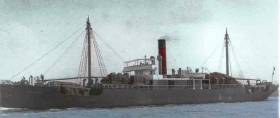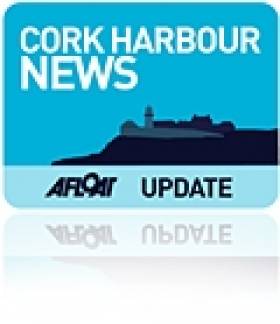Displaying items by tag: Easter Rising
An Island Nation – But Not Yet A Maritime One!
I love Irish history. It is the story of the Irish people, living in an island nation. But I have always wondered about a maritime, a shipping aspect of the Easter Rising, the commemoration of which has raised the profile of our evolution as an independent country. And that is – would it actually have been possible for the AUD, the German ship with weapons and ammunition for the Irish Volunteers, by arrangement with Roger Casement, to have landed its cargo in Tralee Bay, which is the accepted historical conception of that part of the plans for the Rising.
I have always wondered about the challenge and difficulties of getting 20,000 rifles, 10 machine guns and 3.5 million rounds of ammunition off that ship in the conditions and shipping facilities of Tralee Bay and the probably only realistic landing site at Fenit in 1916.
Was it to have been done at Fenit? In the facilities there for unloading in 1916 would that actually have been possible? Was it thought that the cargo might be got off into open boats in the Bay?
I got my opportunity to ask that question of an expert on the period last weekend, Dr. John Treacy, who was recently awarded his Ph.D. from Mary Immaculate College in Limerick for his doctoral thesis about the Naval Service.
He answered me very directly: “I would say absolutely not.”
He had a lot more to say about the AUD and the plan for it to provide weaponry for the Volunteers when I interviewed him at a seminar which underlined the huge public interest in Irish maritime affairs. “Revolution on an Island -The Maritime Aspects of the 1916 Rebellion,” was organised by the Irish Maritime Forum. It was booked out. People attended from all over the country. There was even a waiting list for places at the National Maritime College in Ringaskiddy on the edge of Cork Harbour where it was held.
Dr. Treacy spoke on ‘The Silent Shore – The Attempt to land arms at Banna Strand from the AUD.” It is a fascinating part of Irish history and the maritime involvement. If you have any interest at all in our history, I urge you to listen to him below on my programme, THIS ISLAND NATION.
It was also an unusual experience for me at that seminar to find myself being quoted at the outset. It was for my description of Ireland as an “island nation” which is accepted by the Forum, which is an independent think-tank on maritime matters. But the Forum had a qualification – “Ireland is not yet a maritime nation”
You can hear more about this from retired Naval officer, Capt. James Robinson, who discusses it with me on behalf of the Forum. Not a lot has been heard about the Forum in public, but this seminar was a revelation.
Simon McGibney, the new Commodore of the Irish Cruiser Racing Association, talks to me about his plans for this year’s sailing and the retirement of one of the country’s longest-serving lifeboatmen, from the RNLI Rosslare Station, is reported while there is also good advice on the programme about using vehicles to launch and recover boats from slipways in view of the Buncrana tragedy.
THIS ISLAND NATION reports on the marine traditions, culture, history and modern maritime developments of our island nation. I hope you enjoy it and would welcome your comments. You can Email to: [email protected]
#CORK HARBOUR NEWS - Two anchors were recovered recently from the wreck of the historic Easter Rising gun running vessel in Cork Harbour, as The Irish Times reports.
Divers led by Eoin McGarry from Dungarvan and archaeologist Laurence Dunne from Tralee retrieved the anchors from the wreck of the Aud some 36 metres below the surface on Tuesday 19 June, in an operation that was two years in the planning.
The Aud was carrying 20,000 rifles and millions of rounds of ammunition in a shipment from the German military, arranged by Roger Casement, when the British navy uncovered the plan and took the vessel as it approached Tralee Bay.
But the vessel was scuttled by its Captain Karl Spindler as the ship was being taken to Cork Harbour. The wreck has rested at the bottom of the harbour near Daunt's Rock ever since.
The Department of Arts, Heritage and the Gaeltacht says the anchors will be undergoing conservation work over the next three years and will eventually be displayed in various locations provided by Cobh Town Council and Tralee and Fenit Harbour Commissioners.
RTÉ News has video footage of the dive team's discoveries, while The Irish Times has more on the story HERE.


























































